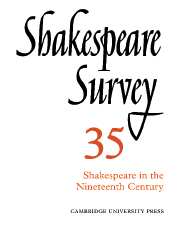Book contents
- Frontmatter
- Before the Shakespeare Revolution: Developments in the Study of Nineteenth-Century Shakespearian Production
- The Meininger Company and English Shakespeare
- Shakespeare at the Burgtheater: From Heinrich Anschütz to Josef Kainz
- Shakespeare on the Melbourne Stage, 1843-61
- Shakespeare in Hazlitt’s Theatre Criticism
- Characterization of the Four Young Lovers in A Midsummer Night’s Dream
- Queenly Shadows: On Mediation in Two Comedies
- Language, Theme, and Character in Twelfth Night
- The Art of the Comic Duologue in Three Plays by Shakespeare
- ‘Spanish’ Othello: The Making of Shakespeare’s Moor
- Ferdinand and Miranda at Chess
- Shakespeare’s Latin Citations: The Editorial Problem
- The Theatre at Christ Church, Oxford, in 1605
- Interpretations of Shakespearian Comedy, 1981
- The Year's Contributions to Shakespearian Study 1 Critical Studies
- 2 Shakespeare’s Life, Times and Stage
- 3 Textual Studies
- Index
- Plate Section
The Year's Contributions to Shakespearian Study 1 - Critical Studies
Published online by Cambridge University Press: 28 March 2007
- Frontmatter
- Before the Shakespeare Revolution: Developments in the Study of Nineteenth-Century Shakespearian Production
- The Meininger Company and English Shakespeare
- Shakespeare at the Burgtheater: From Heinrich Anschütz to Josef Kainz
- Shakespeare on the Melbourne Stage, 1843-61
- Shakespeare in Hazlitt’s Theatre Criticism
- Characterization of the Four Young Lovers in A Midsummer Night’s Dream
- Queenly Shadows: On Mediation in Two Comedies
- Language, Theme, and Character in Twelfth Night
- The Art of the Comic Duologue in Three Plays by Shakespeare
- ‘Spanish’ Othello: The Making of Shakespeare’s Moor
- Ferdinand and Miranda at Chess
- Shakespeare’s Latin Citations: The Editorial Problem
- The Theatre at Christ Church, Oxford, in 1605
- Interpretations of Shakespearian Comedy, 1981
- The Year's Contributions to Shakespearian Study 1 Critical Studies
- 2 Shakespeare’s Life, Times and Stage
- 3 Textual Studies
- Index
- Plate Section
Summary
IN GENERAL!: CRITICAL QUESTIONS, TRENDS, APPROACHES
‘You are confusing two concepts,’ wrote Chekhov, ‘The solution of a problem and the correct posing of a question. Only the second is obligatory for an artist.’ This observation seems obviously relevant to Shakespeare’s works and, by extension, to critical interpretations of them. Indeed, some of the most interesting essays published recently seem designed, not to posit final solutions, but to consider the ways in which various questions are posed within the works themselves. Representative discussions of The Merchant of Venice may serve to illustrate these points.
In his article on ' The Jew and Shylock', D. M. Cohen confronts, head-on, the problems posed by the overt anti-Semitism of Shakespeare's text. Cohen concludes that critical arguments whereby (a) Shylock is 'a better man than we might be disposed to believe', or (b) that he is' not really human', or that (c) the play is not anti-Jewish (just anti-Shylock), simply cannot account for the 'fear and shame that Jewish viewers and readers have always felt from the moment of Shylock's entrance to his final exit'. These feelings, Cohen argues, represent a more honest and accurate response to the text than sophisticated rationalizations which attempt to 'exonerate Shakespeare from the charge of Semitism'.
- Type
- Chapter
- Information
- Shakespeare Survey , pp. 153 - 173Publisher: Cambridge University PressPrint publication year: 1982

